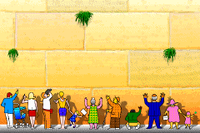Western Wall: Difference between revisions
From the Super Mario Wiki, the Mario encyclopedia
Jump to navigationJump to search
Derekblue1 (talk | contribs) (New article.) |
Derekblue1 (talk | contribs) mNo edit summary |
||
| Line 5: | Line 5: | ||
In the PC versions of ''[[Mario is Missing! (PC)|Mario is Missing!]]'', a Koopa Troopa stole the [[Western Wall brick|brick]] from the Western Wall, forcing the site to close | In the PC versions of ''[[Mario is Missing! (PC)|Mario is Missing!]]'', a Koopa Troopa stole the [[Western Wall brick|brick]] from the Western Wall, forcing the site to close. | ||
== Questions == | == Questions == | ||
Revision as of 23:39, September 5, 2024
- “As the only remaining portion of the sacred Second Temple, the Western Wall symbolizes the original Temple and commemorates its destruction. Located in the Jewish quarter of Old Town, the Western Wall is the holiest site in Jewry. Jewish People come to the Wall to pray and to slip prayers, written on scraps of paper, into the wall's tiny cracks in order that God might directly read the appeals. Following Jewish tradition, men and women pray on opposite sides of the 58-foot high Wall.”
- —Pamphlet, Mario is Missing! (PC)
The Western Wall, is a site of religious observance and a focal point for cultural and national gatherings. It hosts events from solemn commemorations to joyous celebrations.[1] It is located in Jerusalem, Israel.
In the PC versions of Mario is Missing!, a Koopa Troopa stole the brick from the Western Wall, forcing the site to close.
Questions
To prove the brick's authenticity, Luigi must answer two of the following questions:
- According to Jewish tradition, men and women pray:
- on separate sides
- together
- in English
- at different times
- The Western Wall is ___ high.
- 58 feet
- 12 feet
- way
- 28 feet
- The Western Wall used to be called:
- the Eastern Wall
- the Berlin Wall
- the Wailing Wall
- the Second Temple
References
- ^ What Is the Western Wall? Origins and Today's Significance. Retrieved September 6, 2024.
